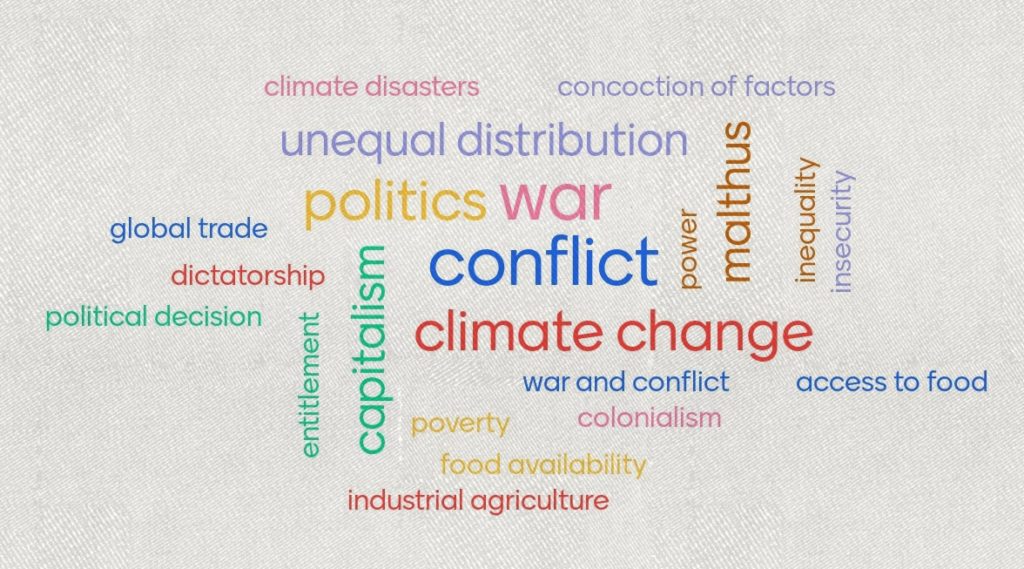What does a zombie have to do with food crises? In the course ‘Food Crises: the Big Picture’, this is an important question for understanding famines. Student editor Maurice Schoo was curious about this ‘undead’ that haunts Wageningen education and so he attended a class.
‘What do you think the reasons for famine are?’ asks course coordinator Bram Jansen during the last lecture of the course. Using Mentimeter, students fill in their ideas about the causes on their smartphones. The answers appear on the smartboard, which displays a colourful word cloud with the words conflict, war, climate change and politics as the most prominent causes. ‘This is quite different from the word cloud we made in the first lecture,’ concludes Jansen. ‘Back then you mentioned natural disasters, drought, overpopulation and war as the main causes.’ Then comes the question: what are the solutions to famine? And this is when the expression ‘killing the zombie’ crops up via Mentimeter. It turns out to be an important subject on this course and it’s about the question: is overpopulation the cause of famine?
Malthus’s zombie
The idea that overpopulation will eventually lead to famine comes from the British demographer Thomas Malthus. He used a simple model to show that populations grow faster than food production, which eventually leads to a food crisis. ‘Malthus’s idea has been repeatedly refuted,’ says Jansen, ‘and yet it keeps on rearing its head again, like an indestructible zombie in a film. So the misunderstanding is called Malthus’s Zombie, a term coined by researcher Alex de Waal.’ This was an eye-opener for the Canadian exchange student Anina Molinar: ‘In a food crisis, people often point to overpopulation or low food production. But I now see that access to food is the biggest problem.’
Hunger is a political problem caused by social inequality
Sumit Vij, teacher
Teacher Sumit Vij explains this in his lecture: ‘The Indian economist Amartya Sen showed that hunger is a political problem that stems from social inequality. In many cases, there is enough food but it is not fairly distributed.’ The course focuses mainly on these political aspects. Jansen: ‘The political issue can sometimes be mismanagement, as a result of which food doesn’t reach the people who need it. But sometimes hunger gets used strategically, in conflict situations, for example.’
Blog
As part of the course, the students have to write a blog about food security. ‘When we first started this course, we got the students to write a policy proposal aimed at improving food security,’ says Jansen. ‘But then we saw the feature Food Business in the Volkskrant newspaper, in which answers are sought to the question of how to feed the world population in 2050. We decided to pick up that theme and turn it into an assignment.’ That proved a good decision: the best blogs were published in the Volkskrant. ‘In a blog, students can express the ideas and feelings about this subject that they have developed over the past few weeks,’ says Vij. ‘Because it is also important to learn how to back up your opinion.’ Jansen: ‘And it’s even nicer if your blog is then published in Resource.
It is also important to learn how to back up your own opinion
All the students’ blogs are about famine, but they approach it from different angles. ‘I write about the sanctions imposed on Niger by ECOWAS, an alliance of West African countries,’ says student Molinar. ‘After the recent coup, that country faced numerous sanctions that had an impact on food security.’ Judith Su is focusing more on agriculture. ‘I want to show that food aid and industrial farming are not the solution to food security in the long term.’ Su is doing the Master’s in Resilient Farming and Food Systems, and is critical of the current system: ‘Industrial agriculture makes farmers extremely dependent on fossil fuels, multinationals and a small number of crops. I think we should focus more on organic farming because that is more appropriate in the long term.’

Societal solutions
The course attracts students from different disciplines. ‘We get a lot of students who don’t have a social sciences background,’ says Jansen. ‘It’s quite a change for some of them, but it’s good to see that there is broad interest in the course.’ Vij: ‘We want to refute the idea that famines come about because of low food production, and that realization is particularly important for a university like WUR, where technical solutions dominate. In many cases, there are also socio-political causes of hunger, and they call for societal solutions.’ For Su, this was a major plus. ‘The course shows that food-related problems are very complex, and it exposes nuances that generally don’t get addressed on the technical courses.’
Blog
Students on the course ‘Food Crises: the Big Picture’ were given the assignment to write a blog on food security. ‘Holy Coca-Cola: quenching thirst or fuelling obesity?’, written by Daphne Leenders,is about the role of Coca-Cola in the Mexican water crisis and the ‘obesity epidemic’.
Also read:

 Hunger and water shortages are a political problem. In many cases, there is enough food and water but it is not fairly distributed. Photo Shutterstock
Hunger and water shortages are a political problem. In many cases, there is enough food and water but it is not fairly distributed. Photo Shutterstock 

